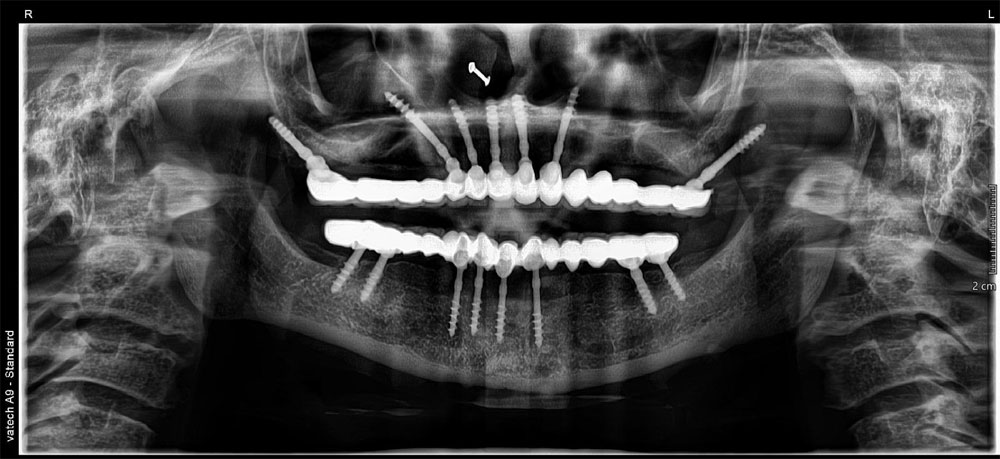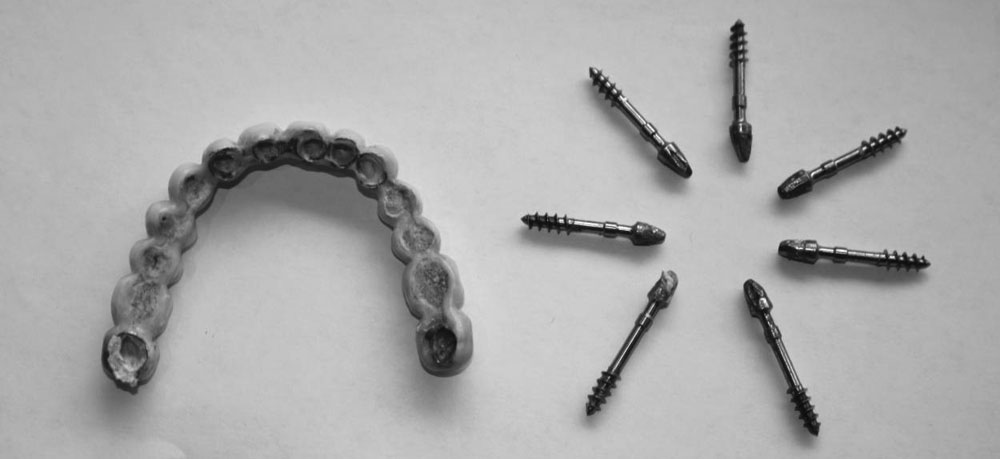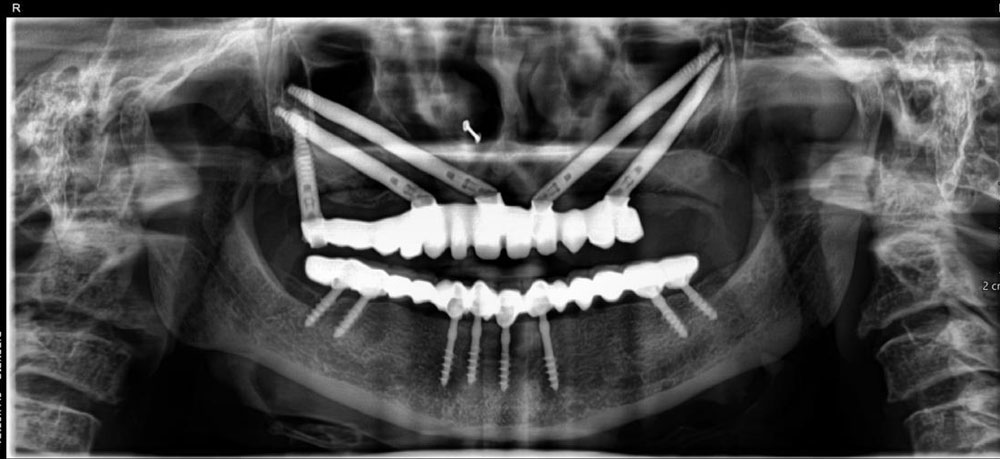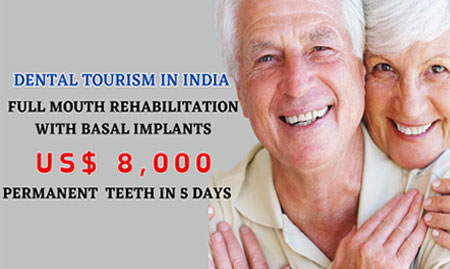
Dr. K Sharada Reddy, Author
Senior Dentist & Full Mouth Rehabilitation Expert
In recent years, dental tourism has gained tremendous popularity among international patients seeking affordable, high-quality dental implants. However, while researching options for full mouth rehabilitation in India, many come across two implant systems Basal implants and Conventional implants. At first glance, basal implants may seem appealing due to immediate loading claims, but a deeper evaluation reveals significant basal implant risks, basal implant drawbacks, and long-term complications associated with the
As experts in full mouth dental implants, We at LBR Dental & Implant Center, Hyderabad, India, considered as the best dental implant clinic in India, strongly recommend that international patients understand the disadvantages of basal implants and explore superior alternatives like immediate loading conventional implants using the CPBCCI Protocol™ developed by Dr. K.A. Reddy.
Are basal implants safe for full mouth rehabilitation:
1. Basal Implants Do Not Osseo integrate,They Osseofix
The most critical drawback of basal implants is their lack of OsseoIntegration. Unlike conventional implants that biologically fuse with the jawbone, basal implants rely on osseofixation a mechanical anchorage into the basal bone. This difference is crucial. Conventional implants, when placed properly, integrate naturally with bone, forming a permanent, stable foundation for the prosthesis.
In contrast, basal implants may loosen over time, especially under functional stress, as there is no biological fusion.
This fundamental difference jeopardizes the long-term success of basal implants particularly for international patients who lack local follow-up support or for those seeking a truly lasting, reliable solution.
2. Higher Number of Implants Increases Risk and Cost
Another major disadvantage is that for full mouth dental implants in India, with basal implants require typically 10 implants in the upper arch and 8 in the lower. This not only increases the surgical trauma and cost, but also limits flexibility during placement.
Conventional implants, using All-on-4 technique or All-on-6 techniques, require only 4 to 6 implants per arch, leaving enough space for:
- Better bone preservation.
- Ideal implant angulation.
- Customized prosthesis design.
In All-on-6 cases, conventional implants offer the flexibility of strategic tilting to engage native bone while avoiding critical anatomical structures like the maxillary sinus or the inferior alveolar nerve to avoid additional surgical procedures like sinus lifts and bone grafts which delay the treatment by several months and also increase the treatment cost and trauma to the individual. This is possible because conventional systems use two-piece implants, allowing precise prosthetic alignment regardless of the implant’s angulation through the use of multi-unit abutments.
In contrast, basal implants come as single-piece mono block designs, which significantly limits flexibility. When these implants are placed at an angulation often necessary due to bone availability, the coronal portion of the implant that supports the prosthesis emerges at an incorrect angle. Since they cannot be corrected prosthetically, the implant itself must be bent at the gum level to straighten it. This bending process carries several risks: it can lead to microfractures in the implant, compromise the surrounding bone, or even loosen the implant altogether. In some cases, the bone may crack, rendering the site unusable for a replacement implant and thereby permanently damaging valuable native bone.
Moreover, because basal implants do not allow for customized prosthetic corrections, this often leads to prosthetic misfit, poor load distribution, or compromised aesthetics, especially problematic in full-mouth cases where long-term function and appearance are critical.
3. Basal Implants Are Cement-Retained, Not Screw-Retained,
Cement retained vs Screw retained prosthesis
The type of prosthesis supported by basal implants is another significant limitation.
Basal implants support cement-retained prostheses, which cannot be removed if any problem arises. If repair is needed, the entire metal framework often needs to be cut and destroyed, rendering the prosthesis unusable.
Worse, in the process of removing the prosthesis, the basal implants already prone to loosening due to the compromised bonding of the implant with the bone (Osseo fixation and not Osseo integration of the implant with the bone) can get damaged permanently.
In contrast, conventional implants support screw-retained prostheses, which offer easy retrievability. In case of wear, damage, or fracture, The prosthesis can be unscrewed, Repaired and re-attached, often within 24-48 hours. This makes screw retained prostheses ideal for immediate loading dental implants India, especially for international patients who may not have immediate access to their original dental provider.


Failed upper basal implant case

Failed basal implant case rescued with conventional Zygomatic and pterygoid implants and teeth loaded immediately at LBR dental and implant center.
4. Risk of Gum Inflammation Due to Excess Cement
Cement-retained prostheses pose another problem with the residual cement. Excess cement can flow into the gum pockets during prosthesis fixation, often going unnoticed. This cement can cause gum inflammation, peri-implantitis, and even bone loss over time.
Since basal implants already lack OsseoIntegration, any soft tissue inflammation can significantly compromise their anchorage.
Screw-retained prostheses avoid this entirely, making them safer, cleaner, and more maintainable for international patients.
5. Basal Implants Are Not FDA Approved
Basal implants are not FDA approved and are not widely practiced in medically regulated countries like the USA, UK, Australia, and most of Europe. This is due to:
- Lack of long-term clinical data,
- Higher failure rates,
- Poor retrievability of prostheses,
- Inability to provide personalized prosthetic adjustments.
If an international patient faces complications with a basal implant prosthesis, local dentists in their home country are unlikely to assist. This leaves them with few or no options for repair or maintenance, forcing a return to the original provider at great expense.
6. Basal Implants Were the Only Option But Not Anymore
For individuals who are opting for full mouth dental implants in India, it is important to understand that basal implants became popular before immediate loading was possible with conventional implants as there was no other alternative to basal implants. At that time, traditional implants required months of healing, often with bone grafting or sinus lift surgeries.
However, with advanced protocols like the CPBCCI Protocol™, conventional implants are now proven to be a better alternative to basal implants for bone loss as they can be :
Immediate loading implants, even in cases of bone loss,
And supported by fixed teeth in just 7 days. This breakthrough gives all the advantages of immediate function implants India, without the complications of basal implants.
Conventional vs Basal dental Implants:
Detailed Comparison Table
| Feature | Basal Implants | Conventional Implants (CPBCCI Protocol™) |
|---|---|---|
| Integration with Bone | Osseofixation (mechanical anchorage) | Osseo integration (biological fusion with bone) |
| Design | Single-piece monoblock | Two-piece system |
| Angulation Flexibility | Limited; must be bent manually, risking implant/bone | High; angulated placement possible using multi-unit abutments |
| Prosthesis Type | Cement-retained (non-removable) | Screw-retained (fully retrievable and repairable) |
| Risk of Prosthetic Misfit | High due to lack of angulation correction | Low; prosthetic alignment customizable |
| Risk of Inflammation | High from residual cement | Minimal; no cement used |
| Retrievability | Difficult to remove/repair | Easily removable for maintenance or repairs |
| Number of Implants Required | 8–10 per arch | 4–6 per arch (All-on-4/All-on-6) |
| FDA Approval | Not FDA approved | FDA-cleared and globally accepted |
| Suitability for International Patients | Low; no follow-up support abroad | High; globally supported systems, easier maintenance |
| Graftless/Immediate Loading Option | Yes, but less reliable long-term | Yes, via CPBCCI Protocol™ without grafts or sinus lifts |
| Aesthetics & Comfort | Compromised due to fixed emergence angle | Superior, with customized prosthetic solutions |
| Treatment Timeline | Immediate loading | Immediate loading (fixed teeth in 7 days) |
| Failure Management | Difficult; damage to bone possible | Easier re-treatment and prosthetic revision |
Final Thoughts: Choose Wisely for Long-Term Peace of Mind
If you are an international patient considering dental tourism in India for full mouth reconstruction, it is crucial to:
Understand the long-term consequences of your implant choice,
Prioritize FDA-approved implants, globally practiced systems, and Opt for a protocol that provides retrievability, customizability, and biological integration.
At LBR Dental & Implant Center, Hyderabad, India, best clinic for failed Basal implant revision in India, we specialize in immediate loading conventional implants using the revolutionary CPBCCI Protocol™, offering:
- No sinus lifts, no bone grafts.
- Fewer implants with optimal placement.
- Screw-retained prostheses.
- A 7-day complete treatment timeline.
We use internationally certified systems like Noris Medical implants and cater to patients from USA, UK, Australia, Canada, and the Middle East who want safe, proven, long-lasting dental implant solutions.
Still Confused About the Right Implant System?
Speak to our expert team. Book a free virtual consultation with Dr. K. A. Reddy, one of India’s leading implantologists, to know more about Alternatives to basal implants for bone loss, the Cost of full mouth implants in India without bone graft and discover why thousands of international patients trust LBR Dental for their full mouth rehabilitation.
FREQUENTLY ASKED QUESTIONS:
Basal implants rely on mechanical fixation into the cortical bone (Osseofixation), and are cement retained, while conventional implants fuse biologically with the bone (OsseoIntegration), providing a more stable and long-lasting solution and support screw retained prosthesis.
Basal implants are not FDA-approved due to several inherent drawbacks of basal implants, including their inability to properly OsseoIntegrate with the bone, lack of retrievability, and limited global acceptance among dental professionals. As a result, international patients may face significant challenges finding support or follow-up care in their home countries, unlike with widely accepted conventional implant systems.
Yes, but with higher long-term risk. Full mouth reconstruction with basal implants can lead to problems in the long run due to lack of proper bone fusion and cement retained prosthesis. Not FDA approved due to the risks of basal implants. The CPBCCI Protocol™ offers safer immediate loading dental implants using the universally accepted Conventional implants that provide better integration.
Yes, conventional implants can absolutely be placed without sinus lifts or bone grafts especially when using the CPBCCI Protocol™ (Crestal Polished Bi-Cortical Conventional Implants) at LBR Dental & Implant Center. This advanced graft less dental implants protocol allows us to place full mouth dental implants without sinus lift or bone augmentation, even in cases with severe bone loss. By strategically angling the implants to engage the native cortical bone, we completely eliminate the need for invasive procedures like sinus augmentation or bone grafting. This approach enables immediate loading implants, reduces healing time, and offers a reliable solution for patients seeking dental implants without bone grafts in India.
If a basal implant prosthesis fails, it can be extremely difficult to manage because these prostheses are typically cement-retained and non-retrievable. Even a minor issue like a crack or chip in the prosthesis may require the entire bridge to be cut into pieces and removed, which is a complex, invasive process. In doing so, there’s a risk of damaging or disturbing the underlying implants, often leading to a complete redo surgery.
In contrast, at LBR Dental & Implant Center, we use screw-retained prostheses on conventional implants placed with the CPBCCI Protocol™. These are easily retrievable, allowing for simple maintenance, repairs, or adjustments without affecting the implants themselves. This makes long-term care safer, easier, and more cost- effective for the patient.
While basal implants may appear cheaper initially, they often require more implants, lack flexibility, and are difficult to repair leading to higher long-term costs. Conventional implants with fewer components and superior performance offer better value.
At LBR dental and implant center, the best dental implant clinic in India, patients receive fixed teeth within 7 days without bone grafts or sinus lifts with the help of our proprietary CPBCCI Protocol™,
Yes. It is a globally practiced, FDA-compliant, and clinically validated protocol developed by Dr. K.A. Reddy, designed specifically for challenging cases like bone loss or failed basal implants.
Yes. We offer free virtual consultations with Dr. K. A. Reddy, the best Implantologist in India, for international patients to assess your condition and recommend the best implant solution.
We use Noris Medical Implants, an FDA-approved, globally accepted implant system known for precision, quality, and success in complex full mouth rehabilitation.
Basal implants are not FDA-approved and are rarely used in medically regulated countries like the USA, UK, or Australia. They depend on osseofixation (mechanical anchorage) rather than osseointegration, which raises concerns about long-term stability. For international patients seeking a reliable, long-lasting full mouth rehabilitation in India, conventional implants using the CPBCCI Protocol™ are a safer, proven alternative.
Basal implant failure is common as they are cement-retained, non-retrievable, and difficult to maintain abroad. When complications arise, local dentists in countries like the US or UK may refuse to treat them. In contrast, screw-retained prostheses on conventional implants can be easily repaired or adjusted, making them ideal for dental tourism India.
The CPBCCI Protocol™ (Crestal Polished Bi-Cortical Conventional Implants), developed by Dr. K. A. Reddy, is a revolutionary system for immediate loading implants in India. It enables implants for severe bone loss without bone grafts or sinus lifts. It uses FDA-approved implants that integrate biologically to provide full mouth implants without bone graft and provide screw-retained fixed teeth in 7 days.
Yes. With the CPBCCI Protocol™, conventional implants can be placed strategically to engage native bone, avoiding the need for invasive sinus lifts or bone grafts. This makes it ideal for international patients looking for full mouth implants without bone graft in India.
No. Basal implants are not FDA approved and lack global regulatory acceptance. That is why you won’t find them used widely in the western countries. Patients from these countries are advised to choose globally accepted, FDA approved implant systems which are considered as safe dental implants for US patients.
Basal implants typically require 8–10 implants per arch, increasing trauma, cost, and complexity. With the All-on-6 or CPBCCI Protocol™, only 4 to 6 conventional implants per arch are needed, All on 4 upper and lower or All on 6 technique, placed with optimal angulation and bi-cortical anchorage for better results and lower complications.
No. Basal implants cannot be customized for angulation as they are single-piece. If angulation is required, the implant must be bent at gum level, risking fractures or bone damage. Conventional implants with multi-unit abutments offer full flexibility and customized prosthetic alignment without bending.
Conventional two piece dental implants using the CPBCCI Protocol™ are the best choice for Full mouth implants for US travellers seeking full mouth reconstruction in India. They are FDA-approved, retrievable, aesthetically superior, and supported by clinics worldwide making them safer and more reliable for long term success.
With the CPBCCI Protocol™, you can receive fixed permanent teeth in just 7 days. There’s no need for bone grafting, sinus lift, or multiple visits. This makes it ideal for dental tourists who want a quick and effective full mouth rehabilitation in a single trip.




